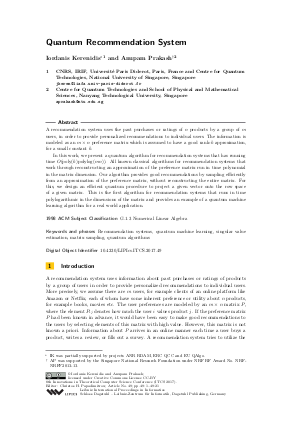Quantum Recommendation Systems
Authors Iordanis Kerenidis, Anupam Prakash
-
Part of:
Volume:
8th Innovations in Theoretical Computer Science Conference (ITCS 2017)
Part of: Series: Leibniz International Proceedings in Informatics (LIPIcs)
Part of: Conference: Innovations in Theoretical Computer Science Conference (ITCS) - License:
 Creative Commons Attribution 3.0 Unported license
Creative Commons Attribution 3.0 Unported license
- Publication Date: 2017-11-28
File

PDF
LIPIcs.ITCS.2017.49.pdf
- Filesize: 0.49 MB
- 21 pages
Document Identifiers
Subject Classification
Keywords
- Recommendation systems
- quantum machine learning
- singular value estimation
- matrix sampling
- quantum algorithms.
Metrics
- Access Statistics
-
Total Accesses (updated on a weekly basis)
0PDF Downloads0Metadata Views
Abstract
A recommendation system uses the past purchases or ratings of n products by a group of m users, in order to provide personalized recommendations to individual users. The information is modeled as an m \times n preference matrix which is assumed to have a good rank-k approximation, for a small constant k.
In this work, we present a quantum algorithm for recommendation systems that has running time O(\text{poly}(k)\text{polylog}(mn)). All known classical algorithms for recommendation systems that work through reconstructing an approximation of the preference matrix run in time polynomial in the matrix dimension. Our algorithm provides good recommendations by sampling efficiently from an approximation of the preference matrix, without reconstructing the entire matrix. For this, we design an efficient quantum procedure to project a given vector onto the row space of a given matrix. This is the first algorithm for recommendation systems that runs in time polylogarithmic in the dimensions of the matrix and provides an example of a quantum machine learning algorithm for a real world application.
Cite As Get BibTex
Iordanis Kerenidis and Anupam Prakash. Quantum Recommendation Systems. In 8th Innovations in Theoretical Computer Science Conference (ITCS 2017). Leibniz International Proceedings in Informatics (LIPIcs), Volume 67, pp. 49:1-49:21, Schloss Dagstuhl – Leibniz-Zentrum für Informatik (2017)
https://doi.org/10.4230/LIPIcs.ITCS.2017.49
BibTex
@InProceedings{kerenidis_et_al:LIPIcs.ITCS.2017.49,
author = {Kerenidis, Iordanis and Prakash, Anupam},
title = {{Quantum Recommendation Systems}},
booktitle = {8th Innovations in Theoretical Computer Science Conference (ITCS 2017)},
pages = {49:1--49:21},
series = {Leibniz International Proceedings in Informatics (LIPIcs)},
ISBN = {978-3-95977-029-3},
ISSN = {1868-8969},
year = {2017},
volume = {67},
editor = {Papadimitriou, Christos H.},
publisher = {Schloss Dagstuhl -- Leibniz-Zentrum f{\"u}r Informatik},
address = {Dagstuhl, Germany},
URL = {https://drops.dagstuhl.de/entities/document/10.4230/LIPIcs.ITCS.2017.49},
URN = {urn:nbn:de:0030-drops-81541},
doi = {10.4230/LIPIcs.ITCS.2017.49},
annote = {Keywords: Recommendation systems, quantum machine learning, singular value estimation, matrix sampling, quantum algorithms.}
}
Author Details
References
-
Scott Aaronson. Read the fine print. Nature Physics, 11(4):291-293, 2015.

-
Dimitris Achlioptas and Frank McSherry. Fast computation of low rank matrix approximations. In Proceedings of the thirty-third annual ACM symposium on Theory of computing, pages 611-618. ACM, 2001.

-
Gediminas Adomavicius and Alexander Tuzhilin. Toward the next generation of recommender systems: A survey of the state-of-the-art and possible extensions. Knowledge and Data Engineering, IEEE Transactions on, 17(6):734-749, 2005.

-
Baruch Awerbuch, Boaz Patt-Shamir, David Peleg, and Mark Tuttle. Improved recommendation systems. In Proceedings of the sixteenth annual ACM-SIAM symposium on Discrete algorithms, pages 1174-1183. Society for Industrial and Applied Mathematics, 2005.

-
Yossi Azar, Amos Fiat, Anna Karlin, Frank McSherry, and Jared Saia. Spectral analysis of data. In Proceedings of the thirty-third annual ACM symposium on Theory of computing, pages 619-626. ACM, 2001.

-
Robert M Bell and Yehuda Koren. Lessons from the netflix prize challenge. ACM SIGKDD Explorations Newsletter, 9(2):75-79, 2007.

-
Andrew M Childs. On the relationship between continuous-and discrete-time quantum walk. Communications in Mathematical Physics, 294(2):581-603, 2010.

-
Petros Drineas, Iordanis Kerenidis, and Prabhakar Raghavan. Competitive recommendation systems. In Proceedings of the thirty-fourth annual ACM symposium on Theory of computing, pages 82-90. ACM, 2002.

-
Lov Grover and Terry Rudolph. Creating superpositions that correspond to efficiently integrable probability distributions. arXiv preprint quant-ph/0208112, 2002.

-
Aram W Harrow, Avinatan Hassidim, and Seth Lloyd. Quantum algorithm for linear systems of equations. Physical review letters, 103(15):150502, 2009.

-
Prateek Jain, Praneeth Netrapalli, and Sujay Sanghavi. Low-rank matrix completion using alternating minimization. In Proceedings of the forty-fifth annual ACM symposium on Theory of computing, pages 665-674. ACM, 2013.

-
A Yu Kitaev. Quantum measurements and the abelian stabilizer problem. arXiv preprint quant-ph/9511026, 1995.

-
Yehuda Koren and Robert Bell. Advances in collaborative filtering. In Recommender systems handbook, pages 145-186. Springer, 2011.

-
Yehuda Koren, Robert Bell, and Chris Volinsky. Matrix factorization techniques for recommender systems. Computer, 42(8):30-37, 2009.

-
Seth Lloyd, Masoud Mohseni, and Patrick Rebentrost. Quantum algorithms for supervised and unsupervised machine learning. Arxiv preprint:1307.0411, 2013.

-
Seth Lloyd, Masoud Mohseni, and Patrick Rebentrost. Quantum self analysis. Arxiv preprint:1307.1401, 2013.

-
Seth Lloyd, Masoud Mohseni, and Patrick Rebentrost. Quantum support vector machine for big feature and big data classification. Arxiv preprint:1307.0471, 2013.

-
Christos H Papadimitriou, Hisao Tamaki, Prabhakar Raghavan, and Santosh Vempala. Latent semantic indexing: A probabilistic analysis. In Proceedings of the seventeenth ACM SIGACT-SIGMOD-SIGART symposium on Principles of database systems, pages 159-168. ACM, 1998.

-
Anupam Prakash. Quantum algorithms for linear algebra and machine learning. Ph.D Thesis, University of California, Berkeley., 2014.

-
Anand Rajaraman and Jeffrey D Ullman. Mining of massive datasets, volume 77. Cambridge University Press Cambridge, 2012.

-
Elaine Rich. User modeling via stereotypes*. Cognitive science, 3(4):329-354, 1979.

-
Cyril Stark. Recommender systems inspired by the structure of quantum theory. arXiv preprint arXiv:1601.06035, 2016.

